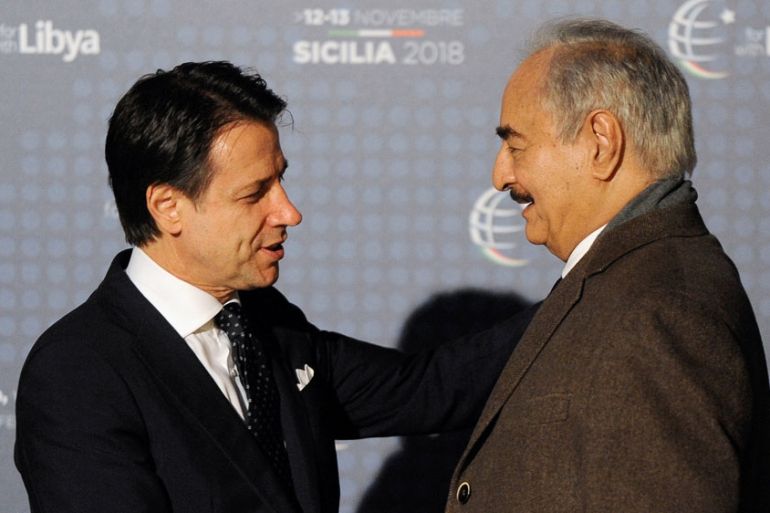Haftar hints at peace with rival until election in Libya
General Khalifa Haftar seems to have extended an olive branch to rival Fayez al-Serraj at Palermo conference.

Palermo, Italy – Renegade General Khalifa Haftar is believed to have extended an olive branch to the rival UN-recognised government of Fayez al-Sarraj, saying he will not seek to topple the Tripoli executive until new elections are held in divided Libya.
Despite Haftar having said he would not participate in the conference, photos released by the Italian government on Tuesday showed him with al-Sarraj and Italian Prime Minister Giuseppe Conte embracing and smiling in a three-way handshake.
Keep reading
list of 4 itemsUS blocks Palestinian push for full UN membership at Security Council
Why is Germany maintaining economic ties with China?
UN’s Libya envoy resigns citing no hope for political progress
It was the first time the two rival Libyan leaders had met face to face since May.
“Using a metaphor, General Haftar told Mr Serraj that you don’t change horses in the middle of the river, meaning that Mr Serraj will retain his post until the elections,” said Rocco Casalino, the spokesperson for Italian Prime Minister, Giuseppe Conte.
|
|
“We interpret this as a conciliatory statement as we aim at reaching an agreement on a broader security framework for the country in view of elections next year,” said Casalino.
Haftar, who leads a self-styled army from Benghazi, has repeatedly threatened to attack Tripoli and take control of the capital, where about 30 percent of Libyans live.
The general, believed to be backed by Russia, Egypt and France, blames the UN-recognised Government of National Accord (GNA) and Tripoli-based institutions of being at the mercy of rival militias. He has also called for a fair redistribution of the oil wealth in the energy-rich country.
Peace until elections?
The Tobruk-based House of Representatives, Libya’s parliament, has aligned itself with Haftar’s request and, over the past weeks, has pursued, together with the High Council of State, Libya’s rival parliament, the removal of al-Sarraj and the Presidential Council he presides over.
But Haftar’s comments to his rival this morning, if confirmed, may signal that Haftar is willing to wait for elections next year, as planned by the UN, to bring political stability in the North African nation.
It is not clear what Haftar has asked the international community in exchange, but diplomatic sources said pressure from Russia and Egypt made him join the talks at Palermo.
Italy is trying to achieve a binding security agreement in Palermo, possibly a unified police and army.
“Elections are for the UN-led process to decide. Creating a climate of security is an essential step for any further process,” an Italian government source told reporters in Palermo.
It remains to be seen whether that would be achieved under a strongman like Haftar or a civilian authority.
Meanwhile, Turkish delegates walked out of the summit in protest on Tuesday, alleging that Haftar and Egyptian leader Abdel Fattah el-Sisi had hijacked the conference, although it did not clarify how.
Ankara later said in a statement that “any meeting excluding Turkey would be counterproductive”.
General Haftar had earlier protested the presence of delegates from Turkey, Qatar and members of the Muslim Brotherhood in previous negotiations on Libya.
More players needed
However, Russia, Egypt and France are aware that a solution to the Libyan conflict cannot be achieved by counting only on Haftar’s leadership.
Libya is profoundly divided along tribal and ethnic lines, and a stable solution to the seven-year civil war may need to involve more than a few internationally sponsored actors.
So far, Haftar’s hold on eastern Libya has been strong and has granted a relative security in the region. But he does not enjoy the same support from militias and tribes in the west, who have loosely aligned themselves to al-Sarraj’s GNA.
In Tripoli, militias have increasingly used their power to blackmail and pillage the sovereign institutions and banks, plunging the Libyan capital into a vortex of violence.
Southern Libya, where state and security institutions have collapsed, has become a safe haven for criminal gangs and foreign militias who disrupt security in the greater Sahel region.
Italy is also concerned with securing Libya’s borders to end the inflow of migrants that depart from its shores to reach Europe, as demanded by Conte’s domestic supporters.
Libya is caught in a spiral of violence, division and political chaos since 2011, when its former leader Muammar Gaddafi was deposed and later assassinated.